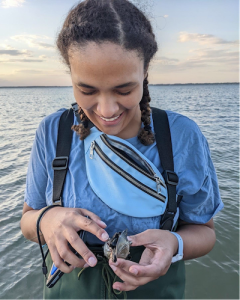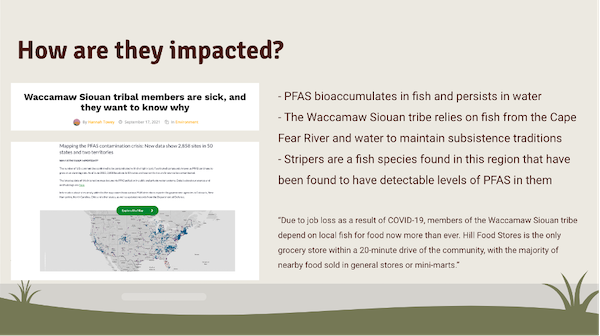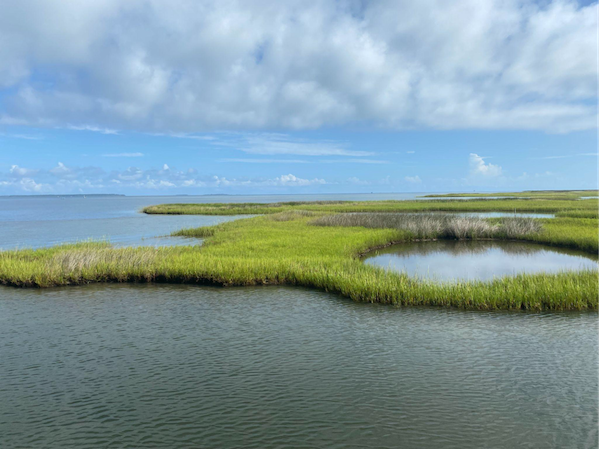By Stephanie Caddell
A Deep Dive into North Carolina’s Fisheries
North Carolina is a state that is well known for its gorgeous coastline and picturesque salt marshes. People flock from all over the country to vacation, recreationally fish, and eat local seafood. Because of the tremendous value of the fisheries industry, it has been a top priority for the State to understand the health of our fisheries and aquaculture.
Over the last two years, the North Carolina Collaboratory has participated in a project to understand the effectiveness of the 1997 Fisheries Reform Act. The Fisheries Reform Act was a piece of legislation passed to require the North Carolina Marine Fisheries Commission to develop ever-evolving management plans to maintain healthy fisheries and waterways.

During the 2022 fall semester, I joined the intern team with the NC Collaboratory to participate on the marine fisheries research team, specifically. Throughout the project, my tasks have involved understanding how human population size has changed in North Carolina before and after the Fisheries Reform Act. I have also been working to understand human interactions with coastal ecosystems and the fishing industry. My main research questions are:
- In North Carolina, which groups are disproportionately impacted by policy and natural systems changes in our fisheries?
- How is the growing population in North Carolina impacting the water quality in each watershed?
In my first semester of the project, I set out to understand the communities most impacted by North Carolina’s fishing policies and regulations. I spoke with experts in the area including Barbara Garrity-Blake, a cultural anthropologist specializing in fisheries. In my interview with her, she shared about the rich history that North Carolina has in fishing and fish processing. Many Black and Brown communities have historically been the backbone of North Carolina’s rich fishing culture. However, many of these communities are growing smaller and smaller as younger generations move away or are not well known in other parts of the State. Nevertheless, these communities are still a big part of the culture of Eastern North Carolina, and I felt that it was important to understand who is on the front lines of working with the State’s fisheries. As an environmental justice minor, I believe it is really important to understand how marginalized communities are impacted by policy and interacting with their local ecosystems. Ultimately, I identified two groups who are disproportionately impacted by unhealthy fisheries or changes in fisheries policy.

The first group I identified was indigenous communities in North Carolina. Many of the tribes who inhabit areas close to or on the coast have expressed concern about the rise of a cancer-causing contaminant found in our waterways, per- and polyfluoroalkyl substances (PFAS). Many people in North Carolina, including indigenous communities, fish recreationally and for subsistence, meaning they eat the fish they catch in our local waterways. Unfortunately, PFAS can build up in fish that live in contaminated waters, and as such, when those fish are caught and eaten, the people eating them become polluted as well. Understanding contaminants in our waterways is important to maintaining the health of the ecosystem and the people who live nearby.
The second group that is greatly impacted by fisheries policy in North Carolina is H-2B (temporary non-agricultural) visa workers in the fishing industry in North Carolina. Most of these workers are women who come from the west coast of Mexico to harvest crabs. However, they can only stay in the country for six months before returning to their home country for six months, where they harvest a similar species of crab. Historically, H-2B workers can be the victims of unfair working conditions, and, as many of them rely on their employers for work, housing, and food, they can often be cheated out of their salaries.
Due to the link between these communities and North Carolina fisheries, it is crucial to understand how legislation and regulation (or lack thereof) will impact these groups. Understanding where there is a lack of regulation is important so that we can alert policymakers of these gaps for the benefit of North Carolinians. This is a complex question, and I am still working to understand it, but I have already learned so much.
In addition to exploring the above questions, I have also been working to understand how the population on North Carolina’s coasts has changed since the Fisheries Reform Act and how it may be impacting our water quality. To do this, I have spent the last two semesters looking at population growth data in each of the State’s watersheds and the nutrients present in our waterways. For example, I am exploring how nutrients like nitrogen vary based on population changes. I am still assessing if the population has a negative or positive relationship with water quality. While I am still exploring trends in the data, participating in the project has taught me so much!

In my research, I am learning how to use coding software to make graphics to share with stakeholders and how to process large datasets. The ability to communicate my science with stakeholders is important because the point of the project is to help policymakers understand what is going on in our waterways and with our fisheries so they can make informed decisions that benefit us all. I find this work important because of its statewide impact. In the future, I hope to work for a government agency such as the Environmental Protection Agency or the National Oceanographic and Atmospheric Administration so that I can continue to conduct science that helps inform political decision-making.
North Carolina is home to such beautiful and valuable coasts that feed us, provide us with recreation, protect us from storms, and so much more. I have learned so much from this project about the importance of our coasts. I hope that the work I have done on this project – and will do on similar future projects – will inform important and tangible policy decisions that work for North Carolina’s ecosystems and us!
Stephanie Caddell recently graduated with a degree in environmental studies and minors in environmental justice and marine fisheries. Stephanie has been an intern with the NC Collaboratory since the fall of 2023.
